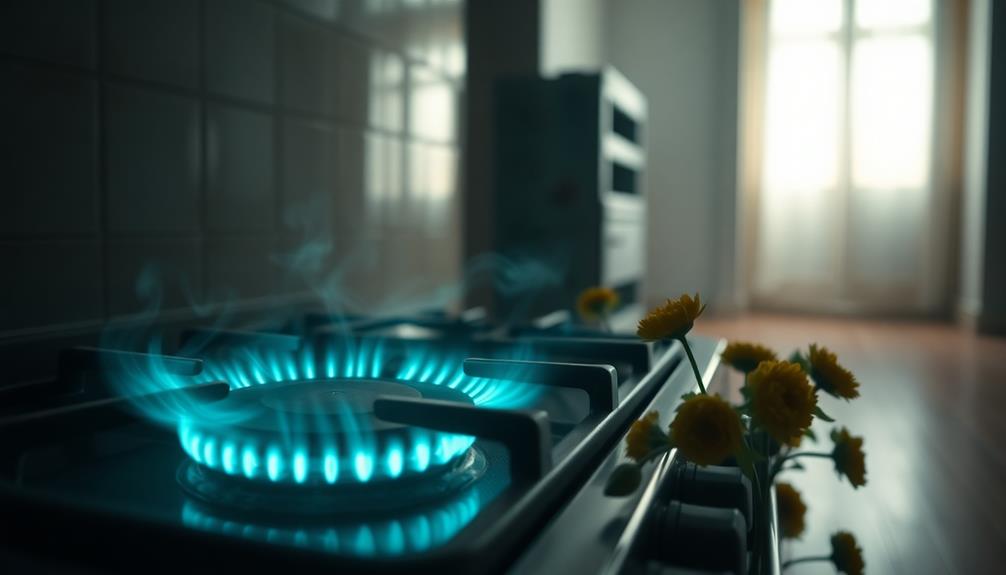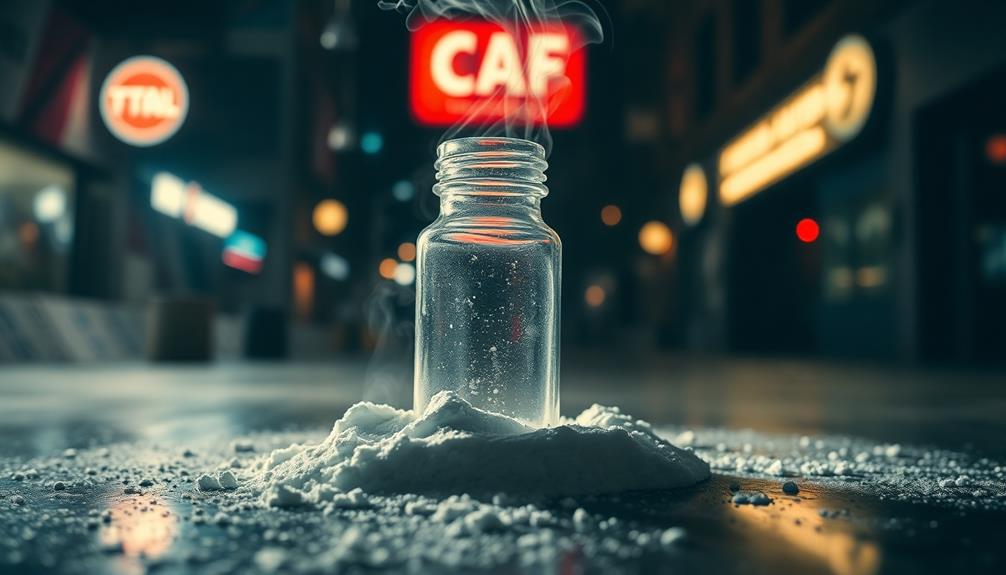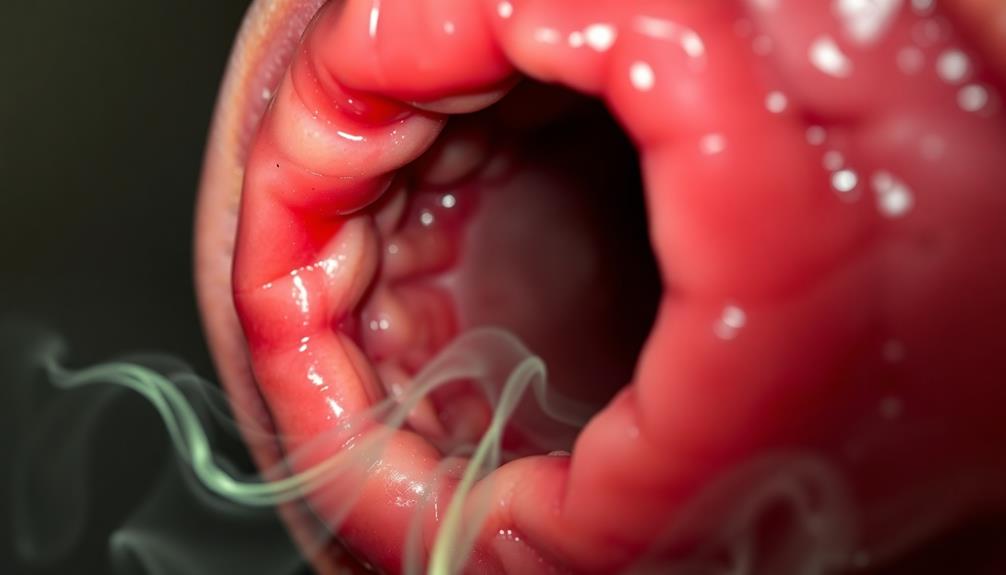A natural gas leak smells like rotten eggs or sulfur, thanks to a chemical called mercaptan that's added for safety. This strong odor is your body's way of signaling danger, so don't ignore it! If you notice this smell, evacuate the area right away without investigating. It's also important to contact emergency services from a safe distance. Remember, even if the smell fades, stay cautious—any unusual scent can still mean trouble. Trust your instincts, and stay alert; knowing what to do next can keep you safe. You'll want to learn about other signs of a gas leak too!
Key Takeaways
- Natural gas is odorless; a sulfur-like smell is added through mercaptan, resembling rotten eggs.
- A strong gas odor indicates a potential leak and should be treated seriously.
- The smell can be detected indoors, near gas appliances, or outdoors near pipelines.
- Environmental factors may cause the odor to fade, but trust your instincts if something seems off.
- Evacuate immediately and contact emergency services if you detect a strong gas smell.
Introduction

When it comes to safety in your home, recognizing the smell of natural gas is crucial. Natural gas itself is odorless, but companies add a substance called mercaptan to help you detect gas leaks. This additive gives natural gas a distinct smell, often compared to rotten eggs or sulfur.
If you ever catch a whiff of this gas odor, your safety depends on your reaction. It's important to know that sometimes environmental factors can cause the rotten egg smell to fade, so don't ignore a faint odor. Always stay alert!
If you notice a strong gas odor, evacuate the area immediately. Don't try to find the source or investigate further; your safety is the priority. Once you're at a safe distance, contact emergency services to report the gas leak.
Understanding this simple yet vital information helps keep you and your loved ones safe. By recognizing the signs of a potential gas leak, you can act quickly and effectively.
Description of the Smell
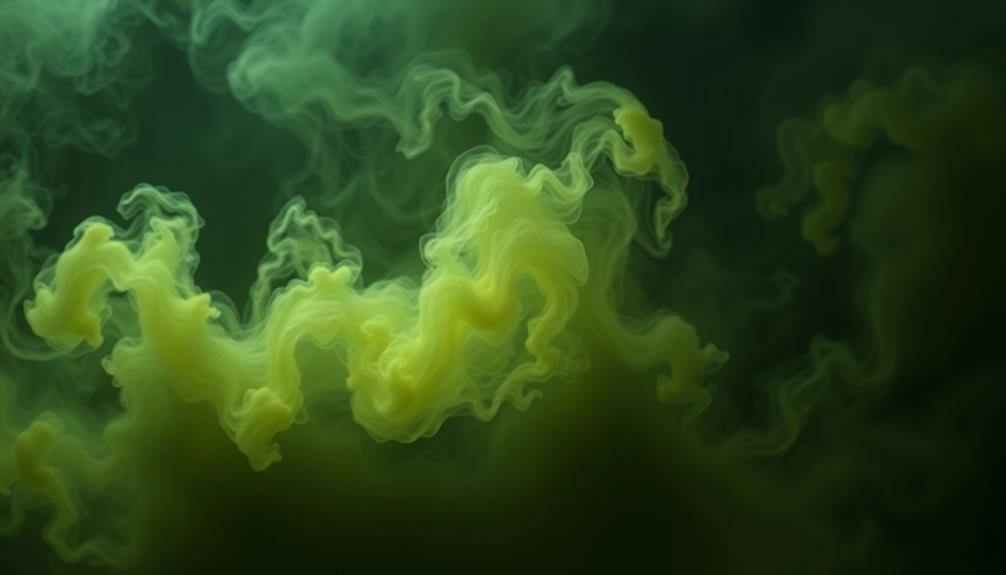
The unmistakable smell of natural gas is primarily due to mercaptan, which gives it a distinctive odor reminiscent of rotten eggs or sulfur. This smell is added because natural gas, in its natural state, is odorless. This distinct odor serves as a crucial safety feature, alerting people to potential gas leaks before they become dangerous. Identifying sewer gas by smell can sometimes be confused with the odor of natural gas, as both can have a similar rotten egg-like scent due to the presence of sulfur compounds. However, sewer gas tends to have a stronger, more pungent odor mixed with other organic smells.
When you catch a whiff of that rotten odor, it's crucial to take it seriously. Mercaptan makes it easy for you to recognize a potential leak before it becomes dangerous.
You might notice this smell indoors or near gas appliances, which could indicate a problem. If you detect this strong odor, don't ignore it! It's important to evacuate the area immediately and report the leak.
Keep in mind that environmental factors can make the smell fade, so always trust your instincts. If something smells off, it's better to be safe than sorry.
Source and Composition
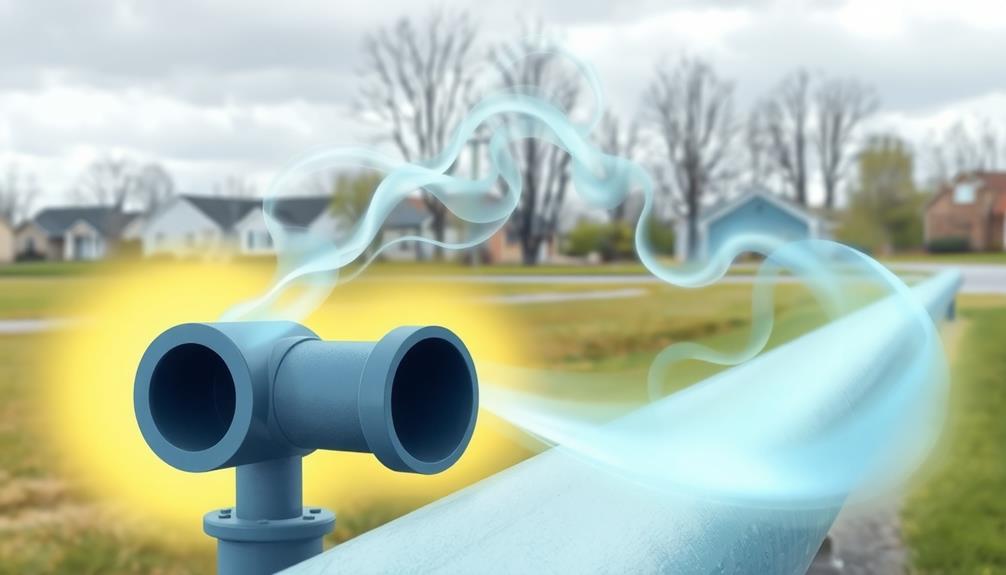
Natural gas mainly consists of methane, a colorless and odorless hydrocarbon that serves as the primary energy source for heating and cooking in many homes.
However, because methane is hard to detect, utility companies add a special substance called mercaptan to natural gas. This addition gives it a distinctive smell, similar to rotten eggs or sulfur, making it easier for you to notice a natural gas leak.
The type of mercaptan used has a strong, unpleasant scent that's easily recognizable, even at very low concentrations. This critical safety feature helps you detect gas leaks quickly, allowing you to take appropriate action.
If you smell this distinctive smell, it's essential to treat it as a serious hazard and act fast!
Keep in mind, though, that under some environmental conditions, the smell of mercaptan may fade.
That's why it's important to stay vigilant for other signs of a leak, like hissing sounds or dead vegetation nearby.
Typical Scenarios or Environments

In residential environments, like homes and apartments, you're most likely to encounter the distinctive smell of mercaptan when there's a natural gas leak. This odor, resembling rotten eggs, is added to natural gas to help you detect leaks quickly.
If you notice this smell while cooking or using your heater, stop what you're doing immediately.
In industrial settings, the smell of mercaptan might be less noticeable due to larger spaces and good ventilation, but don't ignore any strong odor.
If you're outdoors near gas pipelines, you might catch that rotten smell, especially if you hear a hissing sound near the ground. This could indicate a serious gas leak that needs immediate attention.
Even if the smell of gas is faint or fading, treat it as a potential leak. It's always better to be safe.
If you suspect a gas leak, contact your gas company right away. They can send professionals to check the situation and ensure your safety.
Emotional or Cultural Associations

Smelling gas can trigger immediate feelings of anxiety and urgency, pushing you to take swift action for safety. The odor of natural gas, often described as similar to rotten eggs, is a clear warning sign that something may be wrong. This smell isn't just unpleasant; it's a reminder of the potential dangers associated with gas leaks.
Many people have learned to associate that distinct odor with risk, which makes them more alert when they detect it. In some cultures, the rotten egg smell brings back memories of past incidents or stories about gas explosions. These stories can heighten awareness and caution in communities that rely heavily on natural gas.
You might feel a rush of panic or fear when you smell gas, or you may have developed a quick response to check for leaks. This emotional reaction highlights the importance of safety and preparedness in your home.
Understanding that the smell of gas signals a need for action helps you feel more responsible and ready to respond. Always remember to trust your instincts and take any gas smell seriously. Stay safe and be aware!
Health or Safety Considerations

Detecting the sulfur-like odor of gas should trigger immediate safety awareness. This odor, similar to rotten eggs, is added to natural gas for safety purposes since gas is odorless in its natural state.
If you smell this gas near a gas line, it's essential to act quickly. Inhaling high concentrations can cause dizziness, headaches, or even loss of consciousness due to oxygen displacement.
You should evacuate the area immediately. Prolonged exposure can lead to serious health risks, including asphyxiation. Stay away from electrical devices or open flames, as they could ignite an explosion.
For your safety, consider installing gas leak detectors in your home. These devices provide early warnings and can help prevent dangerous situations. Regular maintenance of your gas appliances is also vital.
The more prepared you are, the better you can protect yourself and your loved ones. Remember, if you smell that distinct odor, trust your instincts and prioritize safety!
Always keep your surroundings in check and don't hesitate to call professionals to handle any suspected gas leaks. Your safety is worth it!
Final Thoughts

When a natural gas leak occurs, it's crucial to remember that safety should always come first. You might notice a strange smell, often described as rotten eggs, thanks to a safety additive called mercaptan. If you detect this odor, take it seriously! Leave the area and call emergency services immediately.
But what if you don't smell gas but suspect a leak? Don't hesitate to call for help. Sometimes, the smell can fade due to wind or other environmental factors. Pay attention to other signs too. If you hear a hissing sound or see bubbling water, these could be clues that gas is escaping.
It's also important to remember the dangers of carbon monoxide, which can be produced by gas appliances.
Installing gas leak detectors in your home adds another layer of safety. They can alert you before you even notice a smell.
Frequently Asked Questions
How Do I Know if I'm Smelling a Gas Leak?
If you suspect a gas leak, trust your instincts. Pay attention to any unusual odors, hissing sounds, or dead vegetation around. Don't hesitate to evacuate and contact emergency services for immediate assistance. Your safety's paramount.
Can a Slow Gas Leak Make You Sick?
Yes, a slow gas leak can make you sick. You might experience headaches, dizziness, or nausea if you're exposed for too long. It's crucial to monitor your environment and install detectors to ensure safety.
Is a Natural Gas Leak Smell Strong?
Yes, a natural gas leak smell can be strong. The intensity varies; larger leaks typically produce a more pronounced odor. If you detect any smell, it's crucial to act immediately and report it for safety.
What Smell Can Be Mistaken for Gas?
You might mistake the smell of decaying organic matter or certain cleaning products for gas. Hydrogen sulfide and propane also have similar sulfur-like odors, making it crucial to identify the exact source of the scent.
